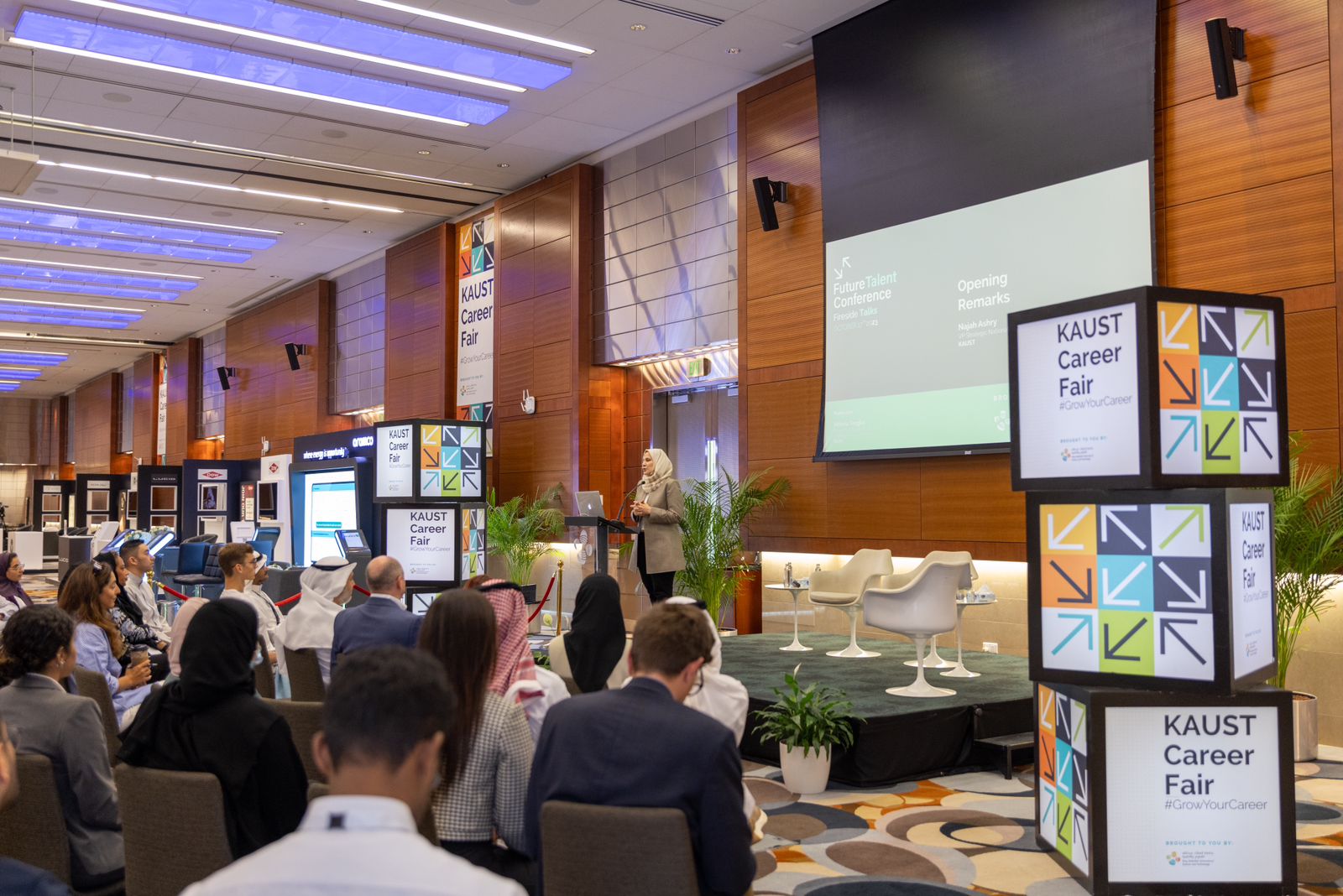KAUST fueling Saudi innovation

Dr. Najah Ashry speaking at the conference.
King Abdullah University of Science and Technology (KAUST) stands out as a prime facilitator for research commercialization and worldwide innovation, as emphasized during the Future Talent Conference: Fireside Talks, setting its graduates on a dual trajectory toward high-quality careers in Saudi Arabia and entrepreneurial ventures within the Kingdom — a testament to the remarkable calibre of KAUST students.
“There’s a formula behind everything that we do,” Dr. Najah Ashry, KAUST Vice President for Strategic National Advancement (SNA), told the conference. “The way we search for students, the way we recruit them, the way we select them, and the way we nurture them while they’re here is about the right talent having the right opportunities, knowing they’ll be ready for a job market that’s still changing and will be even more dynamic in the future.”
Hosted alongside KAUST’s Fall Career Fair, Oct. 17-18, the Fireside Talks featured academic and industry experts exploring collaborative approaches to turn lab research into marketable technology solutions, as well as KAUST’s role in driving the Kingdom’s research, development and innovation (RDI) commitments through talent development.
Ahmed Boshnak, Partner and KSA Head, Bain & Company, said Vision 2030’s objectives for a more varied Saudi economy, coupled with technology, is broadening career prospects for young workers and driving the demand for diverse talent with an increasing focus on meaningful employment. KAUST plays a pivotal role within this evolution. “This has created demand for diversified talent options that we didn’t think about historically.”
Mohammed Turki AlOtaibi, Vice President of Shared Services for SenseTime KSA, an artificial intelligence software firm, said a business model rewarding all those within the innovation ecosystem, providing funds for more research, is key for effective commercialization — something championed at KAUST and through Vision 2030. “This type of cycle rewards the sustainability of this type of commercialization.”
Investment in new ideas and technology obviously is essential to commercializing KAUST research, said Gary Rubin, head of KAUST Innovation Ventures, but so too is investment in the sort of talent KAUST produces. “You might have a great technology, but unless you have the talent, the people and the right mindset to be able to execute, it won’t go anywhere.”
Entrepreneurial spirit
According to Rubin, many start-ups within the KAUST Innovation Ventures portfolio come from students and recent graduates, because typically they have a background and education in technology, coupled with the passion and youthful courage needed to start businesses.
Pavel Putintsev, 22, a first-year Computer Science Master’s Degree student from Russia, found the Fireside Talks inspiring, particularly with its start-up focus. Considering his own career aspirations, Putintsev is pleased, for one, with KAUST’s new strategy and its emphasis on innovation commercialization in the Kingdom, as was highlighted during the conference. “This event I found so multidimensional, as I’m interested in an entrepreneurship career.”
Fellow first-year Computer Science Master’s Degree student Tong Zhang, 22, said the Fireside Talks made her reflect on her potential career — entrepreneurial or otherwise — both in KSA and her native China. She is excited about the unique opportunities a KAUST education provides in the Kingdom. “I know a lot of technology companies are interested in investing in Saudi Arabia, building their offices here, and some of them are very related to my major.”
Collaboration matters
During the Fireside Talks, Dr. Maha Aljuhani, Saline Water Conversion Corporation (SWCC) representative at KAUST, emphasized her role in bridging the gap between academia and industry, not just at KAUST but also with top scientists from various fields, to turn academic research into practical applications, aligning collaborations with Vision 2030.
“Being on campus won’t only help us to start research in collaboration with KAUST, but we also have industry partners like Dow and Aramco here,” she said. “That’ll help us a lot to establish more research collaborations with other industrial entities at KAUST.”
Brian Hession, KAUST research partnership specialist, emphasized how the university advances research to higher technology-readiness levels through research translation funding, and a translation team with industry expertise. “It’s all about dialogue and getting the right people in the room to really get under the skin of the problem to understand what the challenges are and what the faculty can bring to it.”
Opportunity from turmoil
Stavroula Boutsis, manager for Saudi Graduate Recruitment and Development (SGRD) at KAUST, highlighted how recent COVID-19 restrictions amplified ambition, creativity and complex interdisciplinary workplace thinking. She said KAUST students exemplified entrepreneurial mindsets and originality to stay connected during the pandemic. Those honed traits will continue to help them achieve future career success while supporting Vision 2030 aspirations.
“They’re operating in an environment that promotes connectiveness with people. We’re promoting this thinking, taking these ideas and turning them into reality. They’re business savvy. We’re fuelling that interest.”
For Bain, the pandemic expedited technology adoption and remote work, broadening the scope of global talent accessibility. Boshnak said employers must consider various policies to entice young talent. He highlighted remote work and the fundamental role of workplace purpose as increasingly significant. “There are a lot of policies we need to think about when it comes to young talent, but I don’t think it’s just about flex hours and all these different options.”

